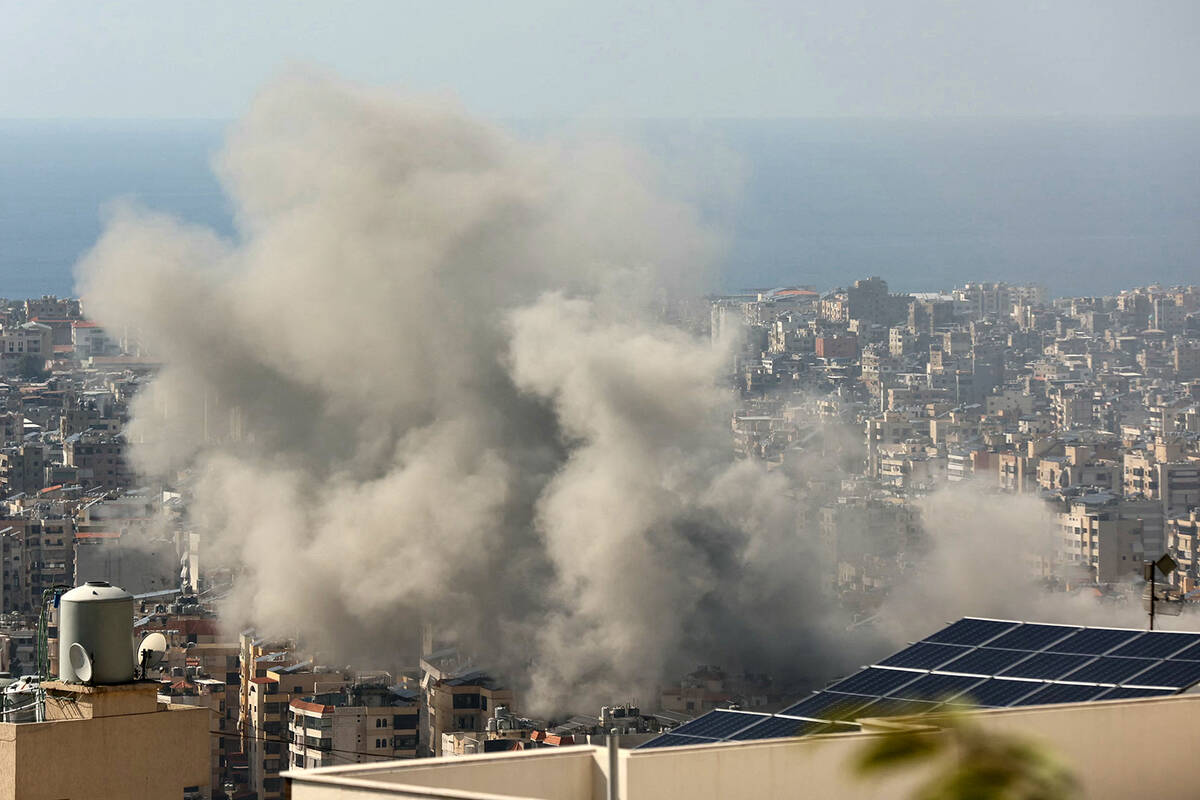Israel hits Beirut as world awaits its response against Iran

Israeli warplanes bombed Beirut and traded hostilities with Hezbollah fighters in southern Lebanon as the country’s forces kept up their campaign against the Iran-backed terrorist group.
Nine people died in the center of the Lebanese capital after an Israeli strike on a medical site affiliated with Hezbollah, according to local authorities. The Israel Defense Forces said it killed 15 terrorists in an overnight airstrike on a building used by the group in the town of Bint Jbeil, and ordered civilians in some areas to leave immediately.
The Lebanese army said an Israeli strike against one of its posts in the south of the country killed a soldier. Israel said Wednesday eight of its troops were killed in battles against Hezbollah, its first casualties since starting a ground incursion earlier this week.
The Israeli government is yet to retaliate for Iran’s barrage of missiles on Tuesday evening, which caused little damage and few casualties. World powers are concerned that, should it strike key Iranian assets, the Islamic Republic will lash out and escalate the conflict, dragging in more countries and potentially disrupting global energy shipments.
President Joe Biden said Israel should hold off from targeting Iran’s nuclear facilities, something Tehran has long warned would provoke an aggressive response.
“The answer is no,” he said to a question about whether the U.S. would support such an attack by Israel. “They have a right to respond, but they have to respond proportionally.”
Israel has carried out a series of devastating attacks in Lebanon since last month that almost wiped out the leadership of Hezbollah, Iran’s main proxy militia, considered a terrorist organization by the U.S. and other countries. Iran said its salvo against Israel was because of those assaults and the assassination of a senior Hamas official in Tehran in July, which the Islamic Republic blamed on Israel.
Israel sent troops into southern Lebanon on Monday in a bid to uproot Hezbollah militants along the border. Hundreds of Lebanese civilians have died in Israeli air strikes in the past two weeks and a million people have fled their homes in the south and some other parts of the country, Lebanon’s government says.
The European Union announced it’s increasing humanitarian aid for Lebanon by 30 million euros ($33 million) to more than 100 million euros a year.
Israeli Prime Minister Benjamin Netanyahu is pushing ahead with the campaign against Hezbollah despite calls by the Biden administration and allies including France and Saudi Arabia for a cease-fire. Netanyahu said his government has no choice because diplomatic efforts to stop Hezbollah drone and missile strikes on Israel have failed.
Lebanese Foreign Minister Abdallah Bou Habib told CNN that Hezbollah’s longtime leader Hassan Nasrallah had agreed to the 21-day truce proposed by the U.S. and other states just days before Israel assassinated him on Sept. 27.
Netanyahu has widespread support domestically for the ground and air offensive in Lebanon, which is also an effort to ensure tens of thousands of displaced Israelis can return to their homes in the north.
The prime minister is under pressure from Israelis to respond far more forcefully to Iran’s salvo than he did in April. Israel hit an Iranian military facility in a limited strike that month, after Tehran fired 300 missiles and drones that were largely intercepted and did little damage.
Israel’s options include targeting the OPEC member’s oil infrastructure or military bases. Potentially the most extreme scenario would be an attack on its nuclear facilities, something called for by former Prime Minister Naftali Bennett, among others.
The Israeli military announced on Wednesday it killed three senior Hamas figures three months ago in an air strike in Gaza. One of them was Rawhi Mushtaha, right-hand man of the group’s leader Yahya Sinwar, whose whereabouts are unknown.
Israel has been fighting Hamas, backed by Iran and considered a terrorist organization by the U.S., since the group invaded the country on Oct. 7 last year, Hostilities have since spread to Lebanon and led to direct Iran-Israel confrontation.
In an effort to reduce the tensions, Saudi Arabia’s Foreign Minister Prince Faisal bin Farhan and Iranian President Masoud Pezeshkian met in Qatar, the state-run Saudi Press Agency reported. Pezeshkian also met Qatar’s ruler, Sheikh Tamim bin Hamad Al Thani.
With assistance from Kateryna Kadabashy, Akayla Gardner, Omar Tamo and Dana Khraiche.